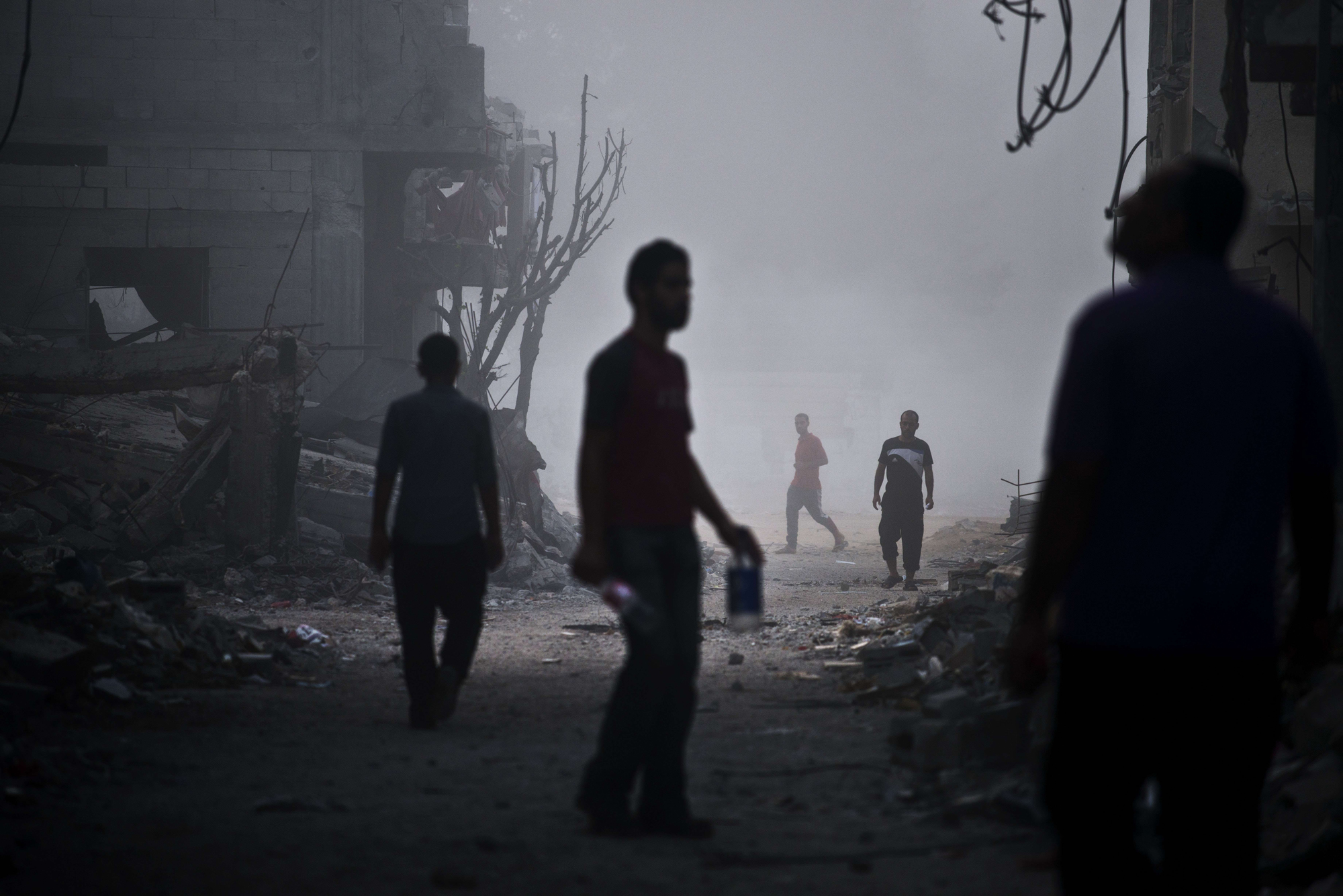
Israeli and Palestinian leaders set out Wednesday to sell their constituents on what was achieved during the latest fighting between the two sides, a day into a cease-fire that ended 50 days of war.
Senior officials on both sides of the conflict declared victory, albeit in very different ways, and laid out the war’s purported achievements. But some found themselves questioning what was really accomplished — and at what price.
In Israel, Prime Minister Benjamin Netanyahu has faced severe criticism from both ends of the political spectrum — from left-wingers who think the war could have been avoided had he not squandered a recent round of peace talks with Palestinian President Mahmoud Abbas, and from right-wingers who say he didn’t go far enough in the latest Gaza war. Netanyahu resisted hawkish calls to have the Israel Defense Forces (IDF) attempt an overthrow of Hamas and a reoccupation of the Gaza, and he shelved his insistence on the demilitarization of the Gaza Strip, which he had been promoting last month as a solution to the conflict.
Avigdor Lieberman, Netanyahu’s own Foreign Minister and among the most prominent critics in his cabinet, slammed the cease-fire deal.
“We object to the cease-fire which offers Hamas the ability to continue to grow strong and fight future battles with Israel whenever it feels like,” Lieberman wrote on Facebook.
Unlike other key national decisions, Netanyahu did not bring the cease-fire deal to his cabinet for a discussion or a vote. After coming under fire for not addressing the nation Tuesday evening when the cease-fire deal was signed, Netanyahu held a news conference Wednesday alongside his Defense Minister and the IDF Chief of Staff, aimed at touting what he said was a mission accomplished, one that will provide “a lasting quiet” for Israel.
“Hamas did not get one of its demands to end Operation Protective Edge,” Netanyahu said, using the name of the Israeli military operation. “It demanded a seaport, it didn’t get it. It demanded an airport, it didn’t get it. It wanted mediation from Qatar and Turkey, it didn’t get it.”
He listed other Palestinian demands — the release of prisoners, the opening of Hamas offices in the West Bank that Israel closed, money — and boasted that Israel refused all of these. Rather, he said, what Israel essentially agreed to was the rehabilitation of Gaza by allowing humanitarian goods to enter.
“A thousand Hamas terrorists were killed, many of them commanders,” he said. “Thousands of rocket arsenals, launch sites and weapons caches were destroyed along with hundreds of command centers.”
Those figures highlight the disparity in Palestinian and Israeli casualties and even how each side measures them: while Palestinians say that at least 70% of the approximately 2,100 Palestinians killed were civilians, Israel says about 50% were Hamas fighters. Seventy Israelis were killed, 64 of them soldiers.
While Israelis debated the war’s outcome and whether it was worth it — more than half say there was no winner, according to a new poll — the mood was more jubilant and less analytical in Gaza City. Palestinians went out to shop, to the bank, to the beach, and in many cases, to see if their homes were still standing. “People are happy that they survived more than anything else,” said Gazan journalist Abeer Ayyoub. “I’m just glad to be alive and that my house wasn’t demolished.”
Hamas rallied its supporters Wednesday afternoon, and many top officials not seen during the past seven weeks of war emerged to speak. Hamas leader Ismail Haniyeh said the blood spilled in the war was “the fuel of this victory.” Wearing a black-and-white kaffiyeh-patterned scarf over his business suit, he counted Hamas’ gains. “This battle is a war that lacks a precedent in the history of conflict with the enemy,” he said, adding that the group was preparing for the “ultimate battle” for Palestinian liberation.
“The war began with fire on Haifa and ended with fire on Haifa,” Haniyeh said, referring to the longer-range rockets Hamas used to target one of the main cities along Israel’s northern coast.
Mkhaimar Abusada, a political analyst at al-Azhar University in Gaza, said many Palestinians view Hamas as victorious simply because of its resilience and its survival.
“If you look at the numbers, we had about 30 times the number of Palestinians killed as in Israel … From this point of view, we didn’t win,” Abusada tells TIME. “But the Palestinians look at it from a different perspective. With limited capability, the Palestinian resistance was able to withstand the Israeli aggression and continue to fight to the last minute. Let’s face it, Israel didn’t reach its goals, because Israel could not stop the launching of missiles, and I’m not really sure they succeeded in deterring the Palestinians.”
More Must-Reads from TIME
- Cybersecurity Experts Are Sounding the Alarm on DOGE
- Meet the 2025 Women of the Year
- The Harsh Truth About Disability Inclusion
- Why Do More Young Adults Have Cancer?
- Colman Domingo Leads With Radical Love
- How to Get Better at Doing Things Alone
- Michelle Zauner Stares Down the Darkness
Contact us at letters@time.com